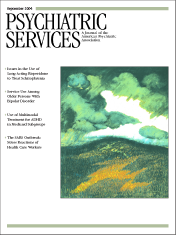Positive Experiences With Giving Gifts to Patients
To the Editor: Dr. Krassner's thoughtful efforts to think through guidelines for the giving of gifts to one's patients, published in the May 2004 issue (1), underscores how seasoned clinicians can offer valuable assistance to trainees and junior colleagues in important areas of clinical practice.
I have had positive experiences with gift giving among very ill clinic patients and higher-functioning private patients, but always after giving careful thought to each case. I monitor for any countertransferential spill; the objective is to acknowledge a life goal or accomplishment for which the patient has worked hard. Recently a clinic patient who had lost her children to foster care when she was hospitalized for a psychotic disorder regained full custody after an arduous three-year battle with the court and foster care bureaucracies. The patient's religious beliefs precluded gifts; however, she was delighted to receive from me a small floral teacup and a theme glass for each of her children to celebrate their reunification.
I have given small wedding gifts to private patients who have achieved a love relationship; small baby gifts, including a "consolation" gift for the older sibling in the case of patients who have had a child; and a small office gift for a 9/11 survivor who returned to her firm having replaced her boss, who died saving her life.
One long-term patient to whom I have given small books for Christmas and her birthday berated me when I forgot one of her birthdays (I do not keep track of the date). Because she organizes her inner life around themes of deprivation and victimization, exploration of her response to my lapse was most productive.
I assure Dr. Krassner that, if he errs in the area of gift giving, he will learn from the experience.
Ms. Matorin is treatment coordinator of the affective disorder team at Payne Whitney Clinic of New York Presbyterian Hospital in New York City and faculty member in the department of psychiatry at Weill College of Medicine at Cornell University in Ithaca.
1. Krassner D: Gifts from physicians to patients: an ethical dilemma. Psychiatric Services 55:505, 2004Link, Google Scholar



